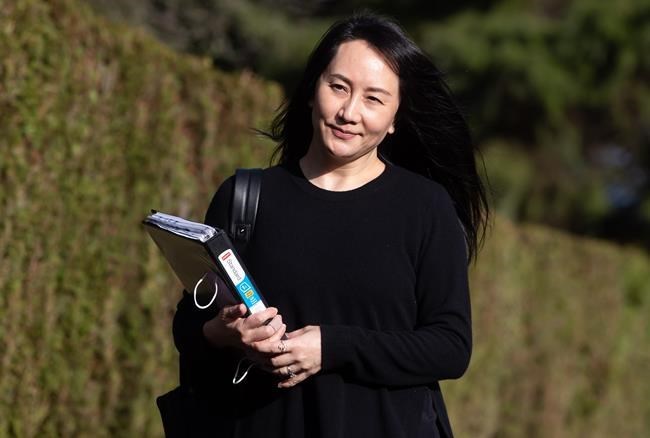VANCOUVER — A lawyer for Huawei executive Meng Wanzhou says a retired Mountie's refusal to testify in the extradition case adds weight to an argument that the officer shared information about her devices with U.S. investigators.
Scott Fenton told a B.C. Supreme Court judge that former staff sergeant Ben Chang is the "most important witness" on the issue of whether electronic serial numbers were improperly shared with the Federal Bureau of Investigation.
"It's simply unprecedented that a police officer would refuse to attend for cross-examination," Fenton said Monday.
The arguments are part of a hearing that will determine if Meng was subjected to an abuse of process by Canadian officials, and if proven, the judge will decide whether the extradition proceedings should be stayed against her.
Meng is wanted in the United States on fraud charges related to alleged violations of U.S. sanctions against Iran, which both she and Huawei deny.
The court has heard that soon after Meng's 2018 arrest, an FBI agent asked Chang for information about the devices in order to enter a legal request to obtain them.
Another Mountie has testified he retrieved the information at Chang's request, but there is no direct evidence that it was ever sent to the FBI.
Chang retired six months after Meng's arrest, moved to Macau, and refused to testify, beyond filing an affidavit saying he did not share the information, Fenton said.
He called Chang's refusal to submit to cross-examination "one of the more troubling elements in the case," noting that the defence cannot subpoena Chang while he is in Macau, which does not have a treaty with Canada.
He urged the judge to give no weight to Chang's written testimony. Instead, he said the judge should reach an "adverse inference," or conclude that the cross-examination would have undermined the claims in his affidavit.
"If he was cross-examined, had he not refused, his evidence would not support his credibility," Fenton said.
Fenton has previously argued the device numbers are a "gateway" to more personal information because law enforcement can use them to request access to things like photos and contacts.
Lawyers for Canada's attorney general have yet to respond in court, but they say in court documents it was the responsibility of Meng's legal team to try to compel Chang to testify, since they called him as a witness.
But Meng's legal team never raised the possibility of compulsion with the Crown or the court, nor did they seek the assistance of a foreign judicial system, and were "instead content to do nothing and seek an adverse inference," the Crown says.
The only reasonable inference to make from that inaction is that Chang's evidence would damage Meng's case, the Crown argues.
There is no evidence Chang shared the information with the FBI, nor is there evidence that the U.S. sought the device information for any improper purpose, they say in the documents.
Fenton further accused the RCMP of "unacceptable, unexplained negligence" because Chang's text messages and emails were wiped and his workstation was replaced following his retirement.
The possible sharing of electronic serial numbers became a "live issue" in the court case weeks before a 90-day window closed on the permanent deletion of material, Fenton said. However, no Mountie took steps to review whether any relevant material was lost, he said.
"Nobody looked, nobody preserved, nobody did anything to prevent the destruction," Fenton said.
Lawyers for Canada's attorney general say the emails and text messages were deleted in the normal course after Chang's retirement.
"The RCMP’s policies around preservation and management of materials do not offend either the perceived or actual administration of justice," the Crown says.
Another one of Meng's lawyers, Richard Peck, began arguing Monday that the RCMP and Canada Border Services Agency took deliberately "shoddy" notes.
The border agency's notes make no mention of a meeting with the RCMP before the arrest. The also don't mention any national security concerns that were later used to justify the agency's screening of Meng, their interception of her at the airport gate, nor the arrest itself, he said.
"This conduct undermines the ability of the defence, Crown and the court to carry out their respective roles," Peck said.
This report by The Canadian Press was first published March 22, 2021.
Amy Smart, The Canadian Press



